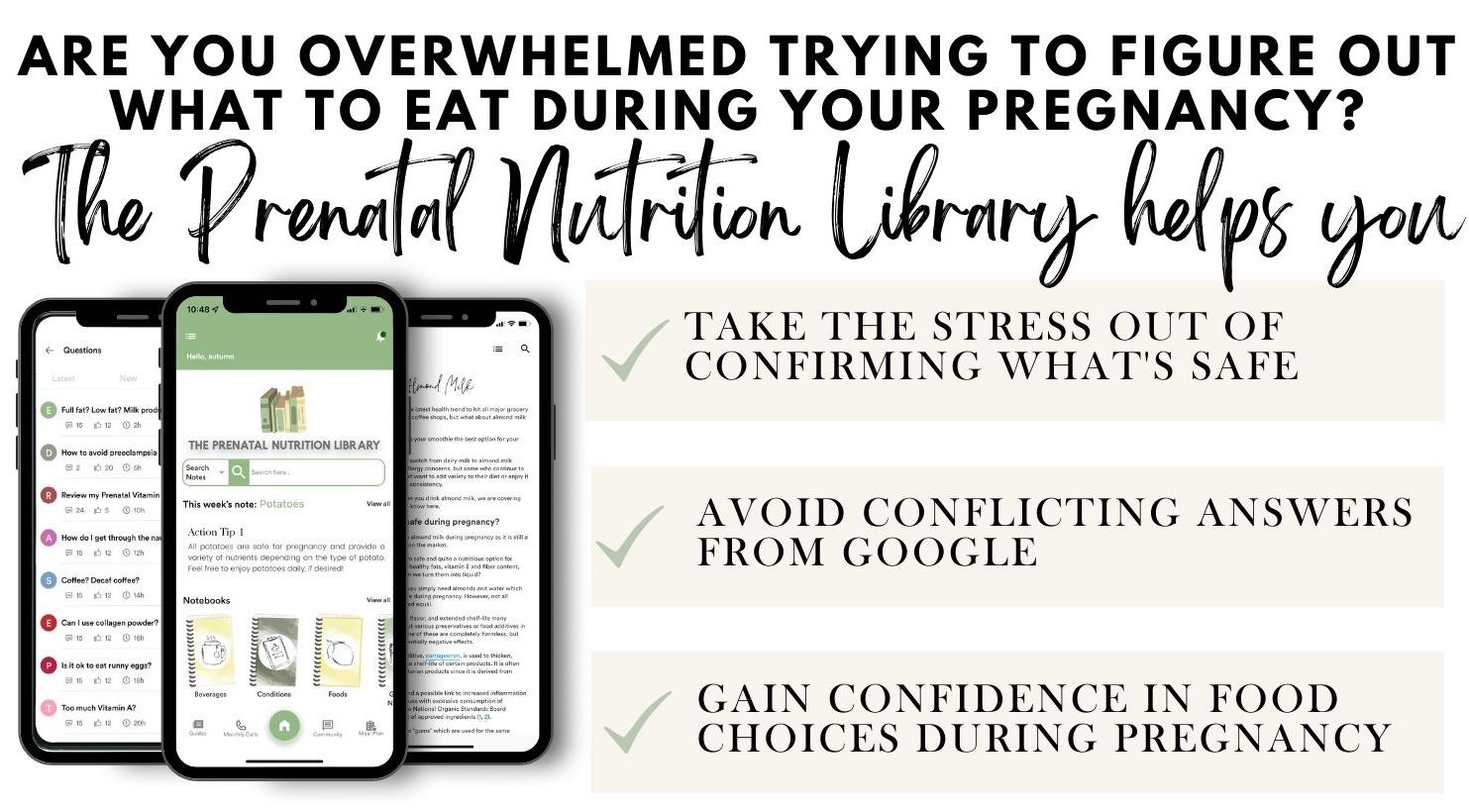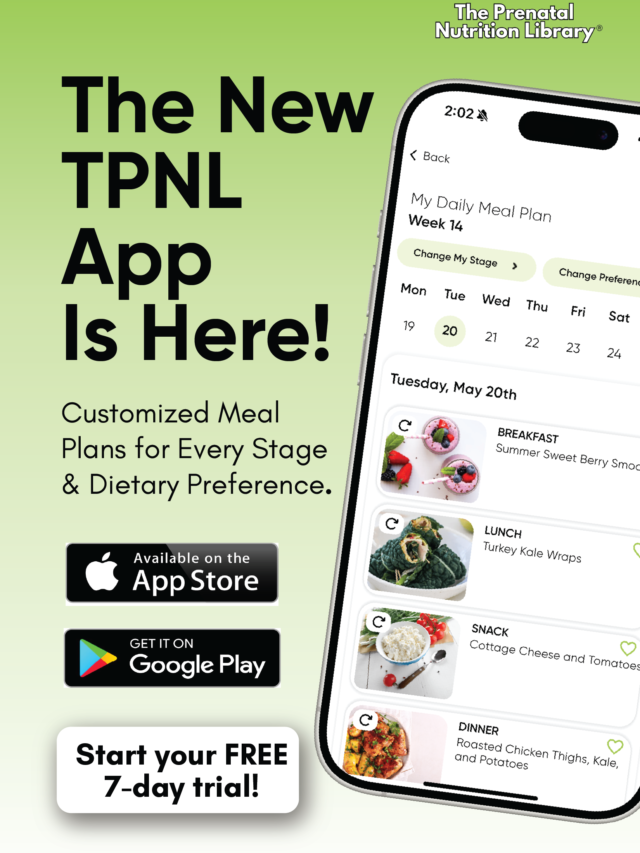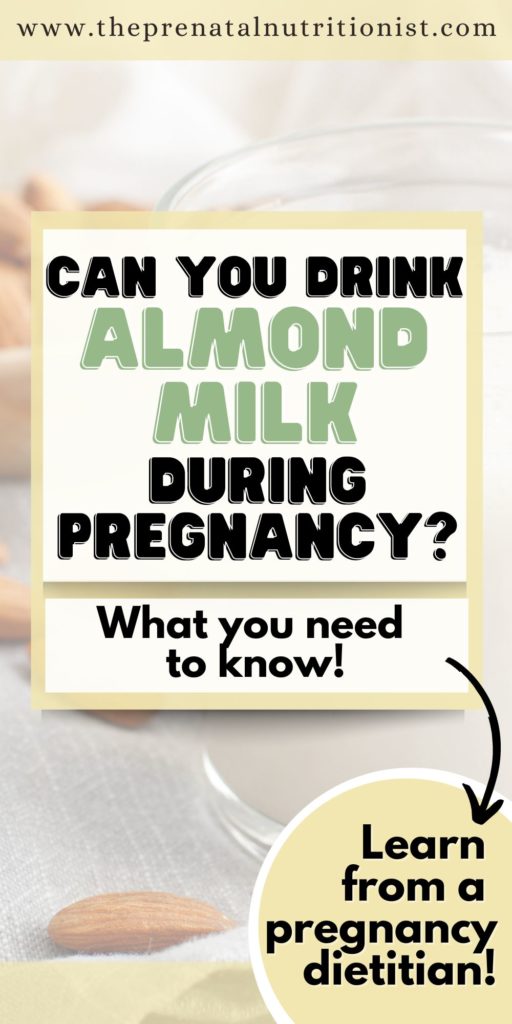
Calcium is one of the essential nutrients you need during pregnancy. It is a vital nutrient for both mom and their growing baby. It is really crucial for supporting the formation of strong bones and teeth, aiding in muscle and nerve function, and helping with blood clotting. Interestingly, our calcium needs don’t increase during pregnancy because our body gets better at absorbing it. However, many people are under consuming calcium.
One of the most convenient ways to get more calcium is to add cow’s milk to your diet! With so many milk and dairy alternative options, it can be hard to know the best milk to drink while pregnant and if they’re all safe to consume. There’s cow’s milk, almond milk, oat milk, and many more for you to consider, and they are nutritionally different.
Cow’s milk is traditionally the most popular, but dairy-free alternatives have grown in popularity over the last several years. One of these alternatives is almond milk. For those who need a dairy-free, plant-based alternative, have dietary restrictions or would prefer another option to cow’s milk, almond milk can be a good choice. It is one plant-based alternative that can fit well into a pregnancy diet.
In this post, we will examine whether consuming almond milk during pregnancy is safe. We will also examine the benefits of almond milk, how it compares nutritionally to cow’s milk, and why it might be a great option for expecting mothers.
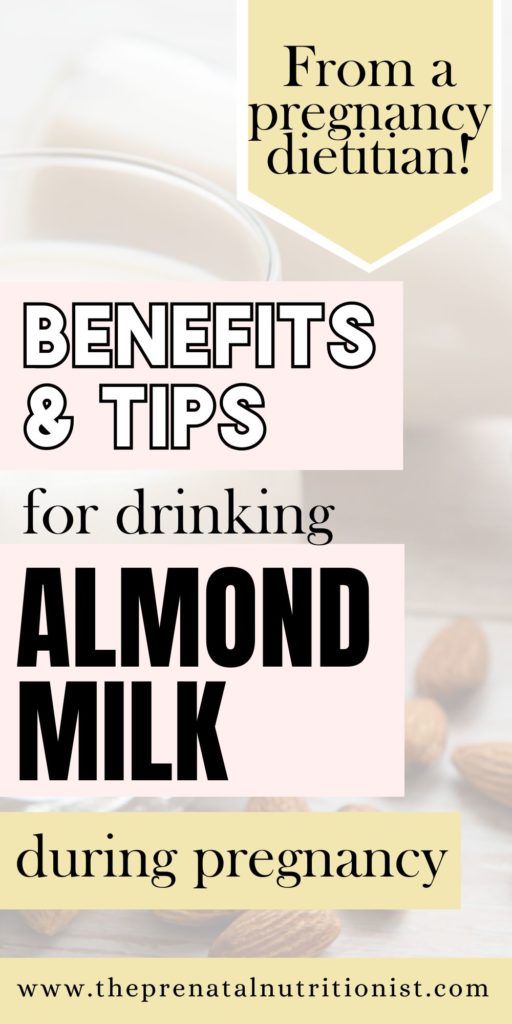
Can You Drink Almond Milk While Pregnant?
Yes, you can definitely drink almond milk while pregnant.
While there’s no research specifically on drinking almond milk during pregnancy, almonds themselves are safe to eat, and there are no proposed concerns about consuming them in “liquid form” while pregnant. Drinking almond milk during pregnancy is generally considered safe for expecting women, especially those with a dairy allergy or sensitivity.
It is important to know that it’s NOT nutritionally the same as cow’s milk.
It may be fortified with essential nutrients like calcium and vitamin D, which are crucial for baby’s skeletal system development. However, if almond milk is unfortified, it will not be a significant source of vitamin D, iodine, or selenium. It does contain less sugar than milk if it is an unsweetened almond milk option.
Almond milk is a good vitamin E source which is a powerful antioxidant. Most people are not deficient, but regular vitamin E consumption does benefit pregnancy, and it is essential to include it in your diet.
Rest assured, if you drink almond milk as a dairy-free swap, or because you enjoy it, it is safe to include. Since it is not a comparable swap for cow’s milk nutritionally, it is essential to include other sources of iodine, vitamin D, and calcium in your diet. Overall, almond milk can be a nutritious and beneficial part of a balanced diet during pregnancy.
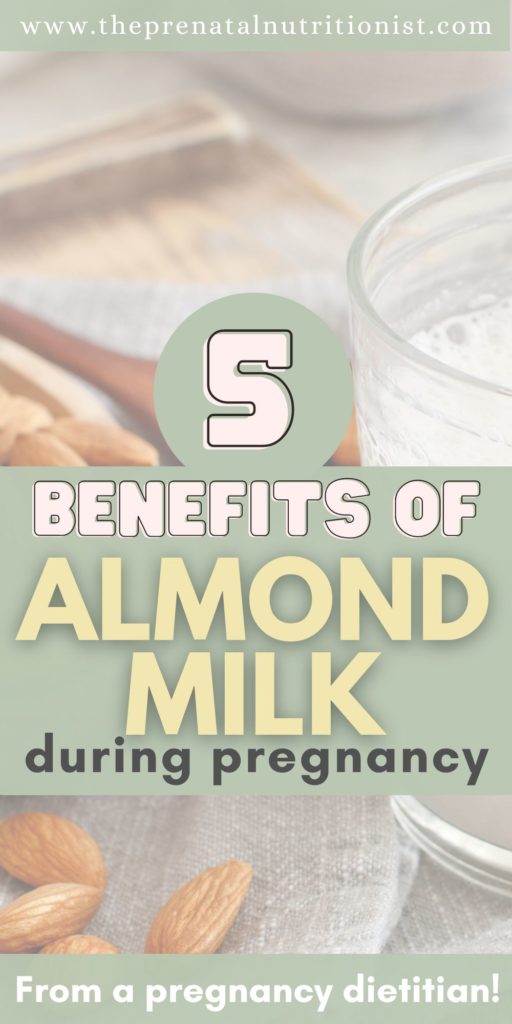
5 Benefits of Almond Milk While Pregnant
Good source of vitamin E.
Almond milk is a good source of vitamin E, which supports immune and skin health. Vitamin E can be found in both fortified and unfortified almond milk varieties. Fortified almond milk may have extra vitamin E, calcium, and vitamin D. Vitamin D is needed for calcium absorption.
Low in sugar when unsweetened.
We recommend choosing unsweetened almond milk during pregnancy. When unsweetened, almond milk is lower in sugar than cow’s milk. Although cow’s milk does contain more sugar, it is important to know that this naturally occurring sugar is like the type found in fruits.
May be fortified with calcium.
Almond milk can be a great source of calcium when it is fortified. High-calcium food and drinks during pregnancy help support the growth and development of your baby’s bones. Adequate calcium intake has also been shown to reduce the risk of high blood pressure or preeclampsia during pregnancy.
Provides a boost of potassium.
Almond milk also provides a boost of potassium. Potassium is an important mineral and electrolyte that helps with fluid balance, hormone production, protein formation, heart function, and more. We need a lot of potassium in our diet, so anywhere we can get a boost of this essential mineral helps meet our daily needs.
Naturally dairy and lactose-free.
As said above, those who are lactose intolerant or have a sensitivity to dairy will find almond milk to be a great alternative as it is naturally lactose and dairy-free. If you experience gastrointestinal symptoms such as bloating and gas when drinking milk, consider almond milk as an alternative option.
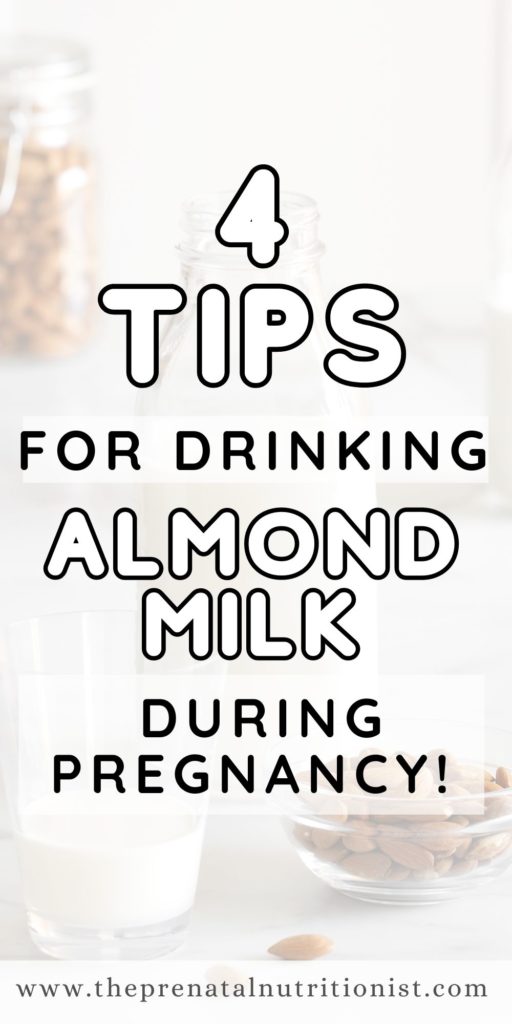
Tips for Drinking Almond Milk When Pregnant
Include other sources of iodine and calcium.
As we’ve mentioned several times, although almond milk is a safe option for pregnancy, it is not nutritionally the same as cow’s milk. If you are using it as a swap for cow’s milk and do not include other dairy sources in your pregnancy diet, be sure to include other food sources of iodine and calcium in your diet.
Besides dairy products, iodine can also be found in seaweed, shrimp, salmon, eggs, and iodized sea salt. Chia seeds, sardines, salmon, kale, spinach, and white beans are other food sources of calcium.
Choose an option with limited food additives.
Not all kinds of almond milk are created equally. When purchasing almond milk, read the food label and check the ingredients. Find an option with simple ingredients, such as almonds and water. Ideally, choose one without carrageenan. If you’re concerned about calcium intake, choose one that is fortified.
Watch out for added sugars.
Along with reviewing the ingredients for additives and simplicity, be aware of added sugars or artificial sweeteners. While sugar and treats can absolutely fit into your pregnancy diet in moderation, it is important to be mindful of overall consumption. Consuming added sugar in excess can contribute to blood sugar dysregulation and other negative health impacts.
Add it to a balanced diet.
Obviously, almond milk by itself will not keep you full. As with most foods, it can be incorporated alongside an overall nourishing and balanced diet. You can integrate almond milk into yummy smoothies and cereals or as a substitute in recipes if you need a dairy-free alternative to cow’s milk. Coconut milk, hemp seed milk, flaxseed milk, cashew milk, and oat milk are other safe alternatives for pregnancy, provided you’re not allergic to any ingredients.
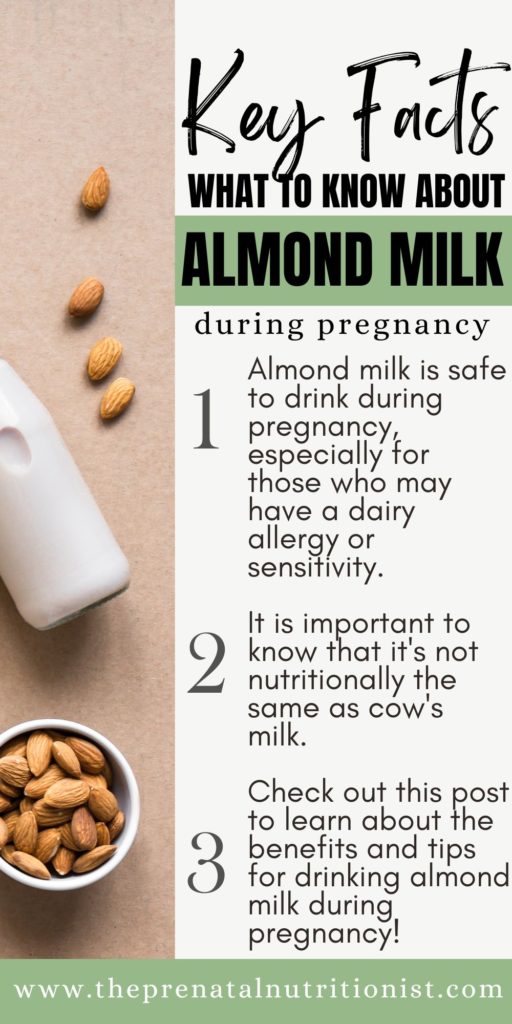
We can help you feel confident in your food decisions during pregnancy.
Growing a baby is hard work. It can be made more difficult with all the pregnancy food myths and misinformation out there. That’s why I created The Prenatal Nutrition Library (TPNL) app! You can get the most up-to-date and evidence-based information at your fingertips when you need it to help you feel confident in nourishing for two before, during, and after pregnancy.
No more stressing about prenatal nutrition; we’re here for you with detailed guides, a question forum with answers from pregnancy dietitians, a private podcast, meal plans, and more!
Check out our Free 1-Week Sample Meal Plan to get a sneak peek and have your meals planned for the whole week. It is the perfect way to get a taste of how great and downright delightful eating for two can be!



